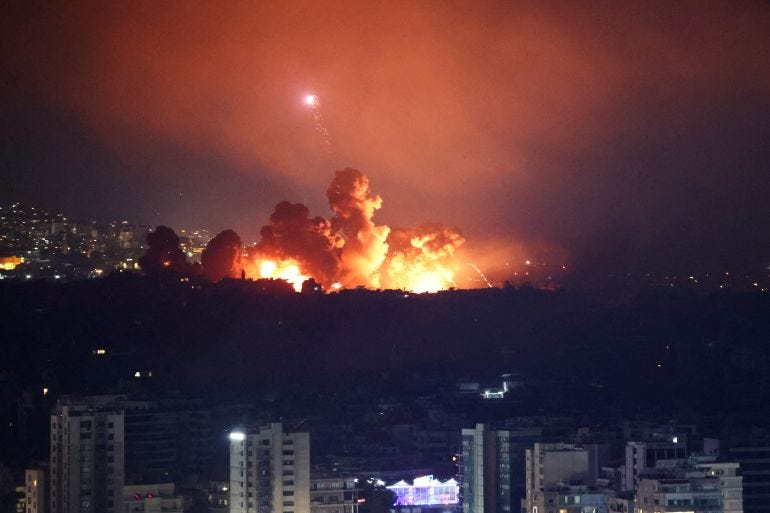Perpetual Conflict: How Netanyahu’s Policies Are Fueling Never-Ending Wars in the Middle East
Israel’s Neoconservative Agenda Escalates Regional Tensions, Drawing in the United States, Europe, and the Arab World
One year after the latest military offensive against Gaza, Prime Minister Benjamin Netanyahu’s government is driving Israel into deeper regional conflicts. These actions reflect a neoconservative approach that promotes ongoing warfare—a strategy that not only devastates Gaza but also risks entangling global powers in never-ending wars. Netanyahu's administration appears intent on maintaining a perpetual state of conflict, expecting to pull the United States, European nations, and surrounding Arab states further into the fray.
On October 1, 2024, the conflict took a dramatic turn as Iran launched its most extensive missile strike on Israel, retaliating against a series of Israeli assassinations targeting key Iranian allies, including Hamas leader Ismail Haniyeh. These assassinations, justified by Israel as necessary for national security, have significantly heightened tensions, triggering Iran’s ballistic missile barrage. This aggressive response underscores the larger pattern: Netanyahu’s government’s actions consistently provoke, or even depend on, escalations that draw neighboring states into conflict, heightening the risk of regional destabilization.

Expanding Regional Impact
Netanyahu’s approach isn’t just about defending Israel—it’s a strategy that ensures continuous regional tensions, affecting Lebanon, Syria, and Yemen. Lebanon has borne the brunt of Israeli airstrikes, with southern Lebanon and Beirut’s suburbs sustaining significant damage. This tactic, part of a larger policy of militarization, is destabilizing the Arab world, forcing countries to navigate increasingly volatile political landscapes. The impact extends beyond the Middle East, as the United States and NATO nations are drawn into Israel’s military agenda.
“Netanyahu’s government ensures that Israel remains in a constant state of militarized alert, pressuring global powers to align with its doctrine of ‘never-ending wars.’”
Israel’s Neoconservative Agenda and Global Implications
This strategy of perpetual conflict is deeply rooted in the neoconservative doctrine championed by Netanyahu’s government. It relies on an aggressive stance that ensures Israel remains in a constant state of militarized alert, with little room for diplomacy or de-escalation. This approach pressures the United States and NATO to align closely with Israel, often at the expense of broader regional stability. By focusing on protracted warfare, Israel’s policies force its allies into complex entanglements that extend well beyond the Middle East.
While Netanyahu’s administration frames its actions as necessary for national security, the reality is that this approach has far-reaching consequences. Europe, facing its own set of security challenges, is increasingly at odds with Israel’s expansive military campaigns. For the Arab world, Netanyahu’s policies threaten to exacerbate internal conflicts and force governments to either acquiesce to or confront Israeli actions. The potential for a wider war is ever-present, as alliances and hostilities intertwine with national interests.

A Call for Diplomatic Solutions
As the international community grapples with the implications of Israel’s policies, a pressing question emerges: How long will global powers continue to support a strategy of perpetual conflict? Netanyahu’s administration may believe that endless warfare is necessary, but this approach ultimately destabilizes the entire region and risks drawing the world into deeper confrontations. A shift toward diplomacy and de-escalation could offer a path forward, prioritizing peace over perpetual conflict and regional stability over narrow national interests.
“As Israel intensifies its military engagement, it risks dragging the United States and the broader international community into a deepening cycle of retaliation.”
Final Note …
In a world already fraught with geopolitical challenges, Netanyahu’s strategy of “never-ending wars” stands as a stark reminder of the need for balanced and pragmatic solutions. Without such a shift, Israel’s policies risk entrenching the region—and the world—in an endless cycle of violence and retaliation. The international community must recognize the costs of this strategy and advocate for a more sustainable approach to Middle Eastern security.






